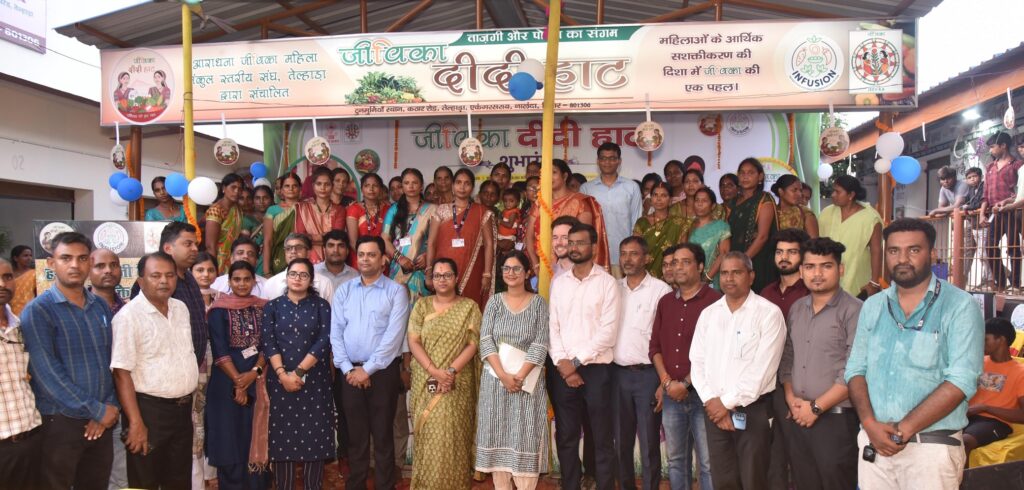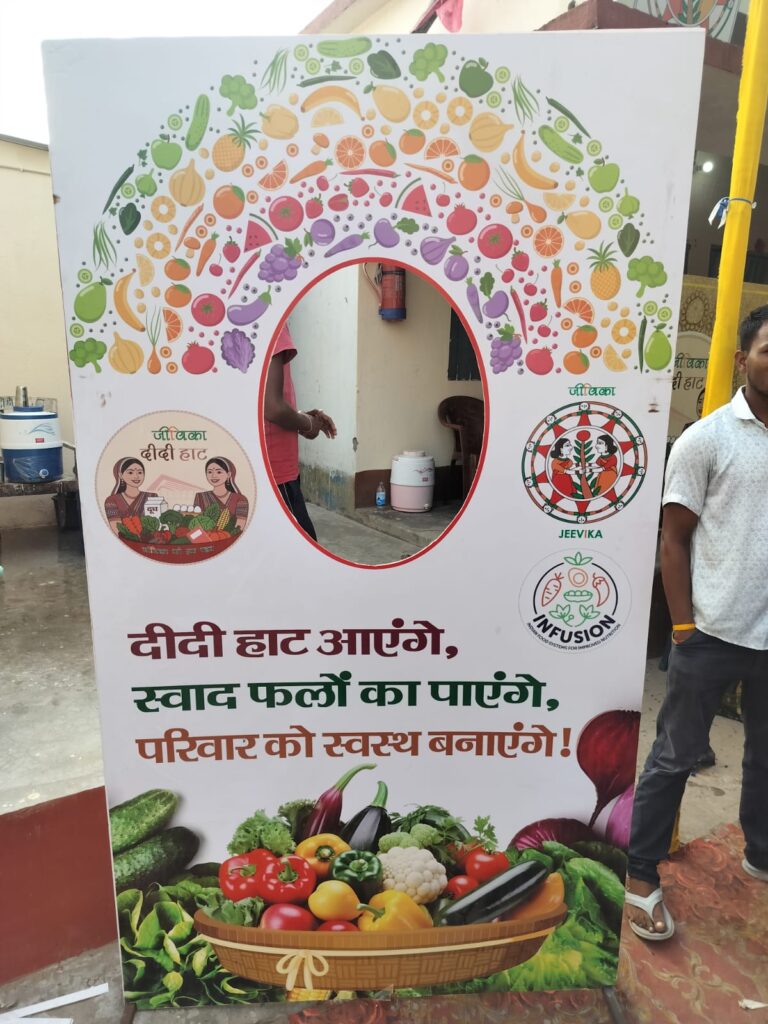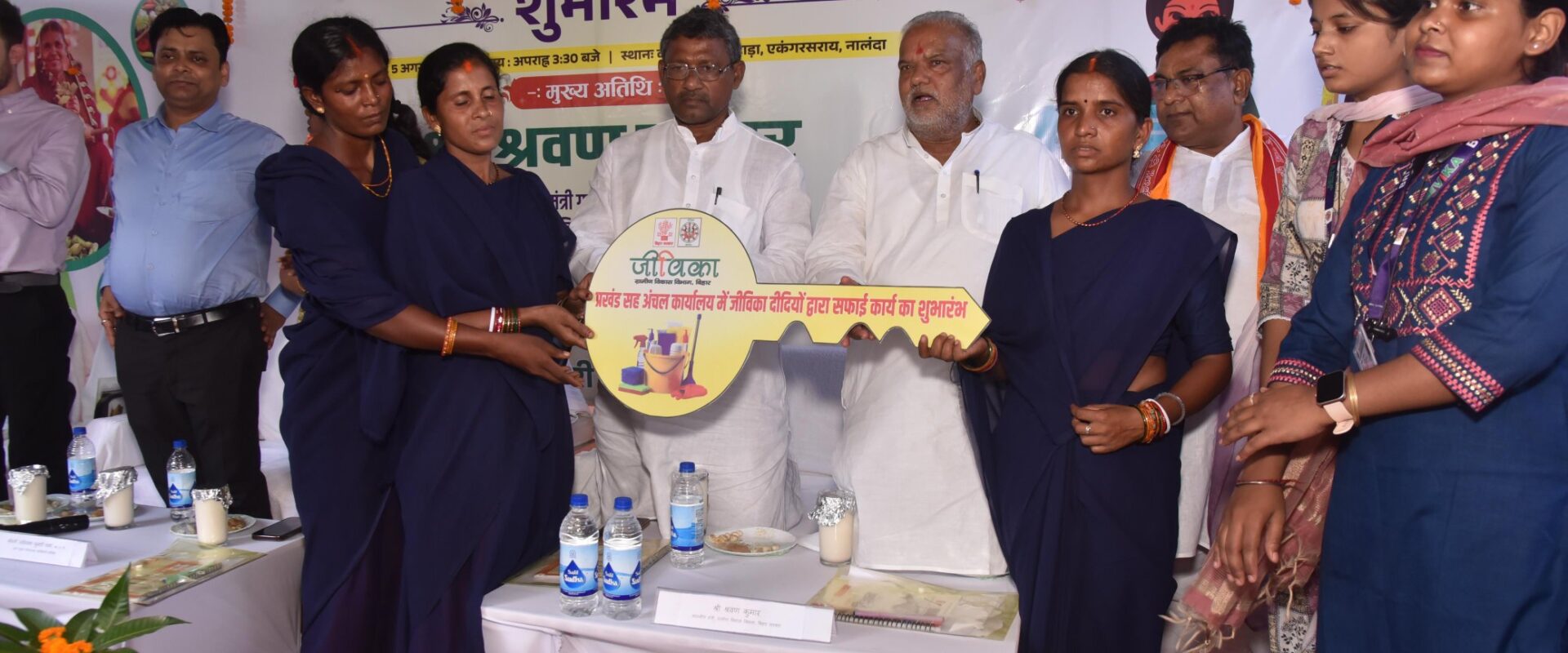Dr Gregory Cooper, INFUSION Research Fellow
Humhare Didi Haat mein aapka swagat hai! (Welcome to our Didi Haat!)
Tuesday 5th August 2025, represented a major milestone for the Indian Food Systems for Improved Nutrition (INFUSION) project. After almost two years of intense planning and an initial soft launch in late-May, attended by our funders from the Gates Foundation and UK FCDO, our JEEViKA Didi Haat finally opened its doors to local food retailers and members of the public in Telhara village, Nalanda district, Bihar!
We were fortunate to have the inauguration officiated by Shri Shrawan Kumar, the honourable Minister for Rural Development (Government of Bihar), as well as the Additional CEO of JEEViKA Abhilasha Sharma ji, IAS, and the JEEViKA State Project Manager for non-farm activities, Samir Kumar ji.

It was the first time I had attended an event of this kind, and wow, it did not disappoint! The haat, decorated on the day to resemble more of a wedding venue than a local vegetable market, really looked incredible, with approximately 100-150 didis (i.e., local JEEViKA self-help group members) attending in great voice. I was incredibly lucky to be able to sit on stage with the guests of honour, and, to my surprise, be asked to give a brief ‘speech’ in Hindi (kam se kam Greg wali Hindi mein) on the aims, objectives and future plans for more Didi Haats across Bihar going forward. Thankfully Sanjeev ji from the Indian School of Business informed me half an hour before the event that I would be speaking – which luckily did not really provide enough time for me to get properly nervous!
As described by INFUSION co-PI Prof Bhavani Shankar here, Didi Haats are built around five primary pillars:
- The availability and affordability of locally produced nutrient-dense foods (NDF) – including vegetables, fruits, dairy products (e.g., milk and curd/dahi), and other animal-source foods (i.e., eggs, meat and fish).
- The promotion of healthy food hygiene practices, including vendor training provided by our partners FICSI on food washing, handling, and storage practices.
- The proper management of food and non-food waste, including the provision of plastic crates to keep vegetables, covered garbage bins, a segregated area for waste management, and a tie up with the local municipal cooperation for formal waste removal.
- Gender and climate sensitivity:
- As the name suggests (Didi Haat – elder sister’s market), the market should be a place where local women feel that they want to spend time, whether that is shopping for groceries, browsing the other types of shops available (e.g., stationary, jewellery and clothes shops), or simply spending time with friends, family or other SHG members. Having spoken to various didis during the participatory design process, we have implemented a number of their key recommendations, including the provision of full-time security guards, night-time lighting, and gender segregated washrooms.
- Market accessibility in Bihar is closely related to the climate, with extreme heat (e.g., during summer) and/or persistent rainfall (e.g., during the monsoon) causing issues ranging from the accelerated perishability of NDFs, to the flooding and subsequent closure of rural markets (as is currently happening across northern Bihar). Uncommon in Bihar, Didi Haat features raised platforms and overhead shelters to provide cover against rainfall and direct sunlight, as well as a functioning water drainage system to remove standing water from the haat. Future haats will also explore the possibility of including small-scale (potentially solar-powered) cold storage units – as to further work towards reducing food waste within the haat.
- Platform for behaviour change communication (BCC): In addition to the above, several materials have been created with the aim of encouraging the enhanced consumption of healthy foods. For example, our colleagues at LSHTM are in the process of developing a series of excellent YouTube videos and participatory activities (e.g., NDF snakes and ladders boardgame) that aim to both educate and motivate people towards the greater consumption of nutrient-dense foods.

With the haat now open for business, we have no time to rest on our laurels! Two parallel data streams are starting: (a) a daily series of Monitoring & Evaluation (M&E) to provide JEEViKA with a high-resolution dataset on the number of NDF vendors, their daily sales, revenues etc., and (b) a mixed-methods process evaluation to understand the broader-scale feasibility of the haat from multiple angles, including the experiences and perceptions of Didi Haat NDF vendors, participants of our BCC activities, providers of training within the haat, and local consumers living within Telhara village (shout out to INFUSION and Sheffield colleague Martin Watts for all his work getting this ready!). With the process evaluation set to run for the next six months, and the possibility of additional Didi Haats to be evaluated on the horizon, we are certainly going to have our hands full (but also very lucky to be in this situation)!
Finally, just to say thank you again to our project partners. INFUSION is a collaboration between the University of Sheffield, London School of Hygiene and Tropical Medicine (LSHTM), Indian National Institute of Nutrition (NIN), Indian School of Business (ISB), MicroSave Consulting (MSC), and JEEViKA, and colleagues from every partner institute have worked hard over the past 24 months to get us to this position. Iske liye bahut bahut dhanyaavad.
Please watch this space for more updates over the coming weeks and months!
